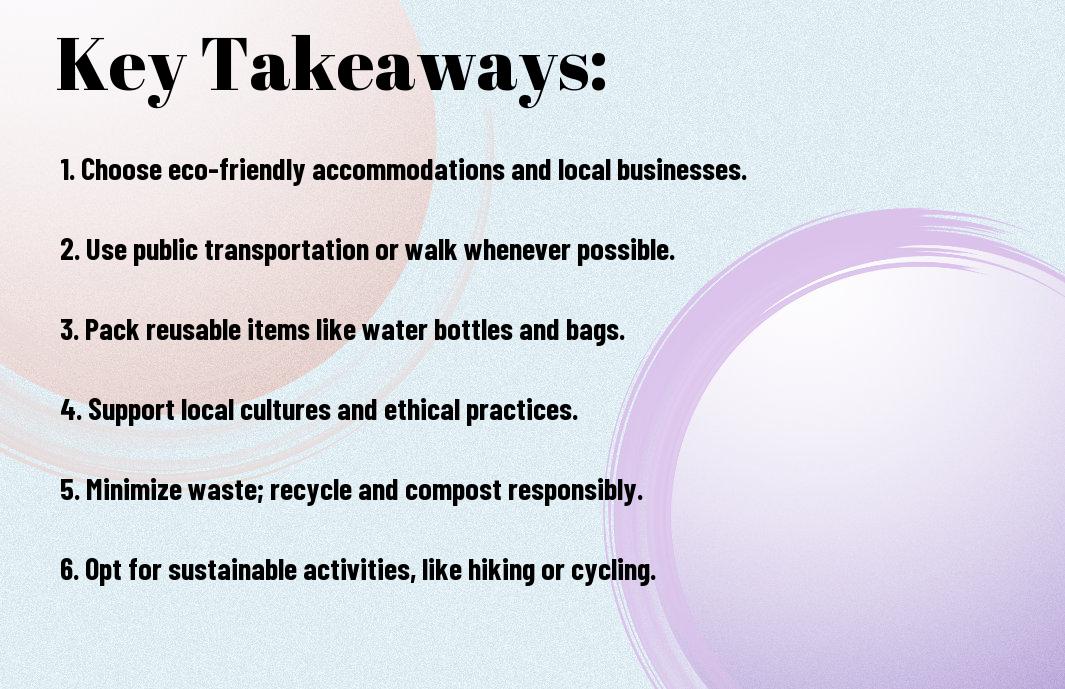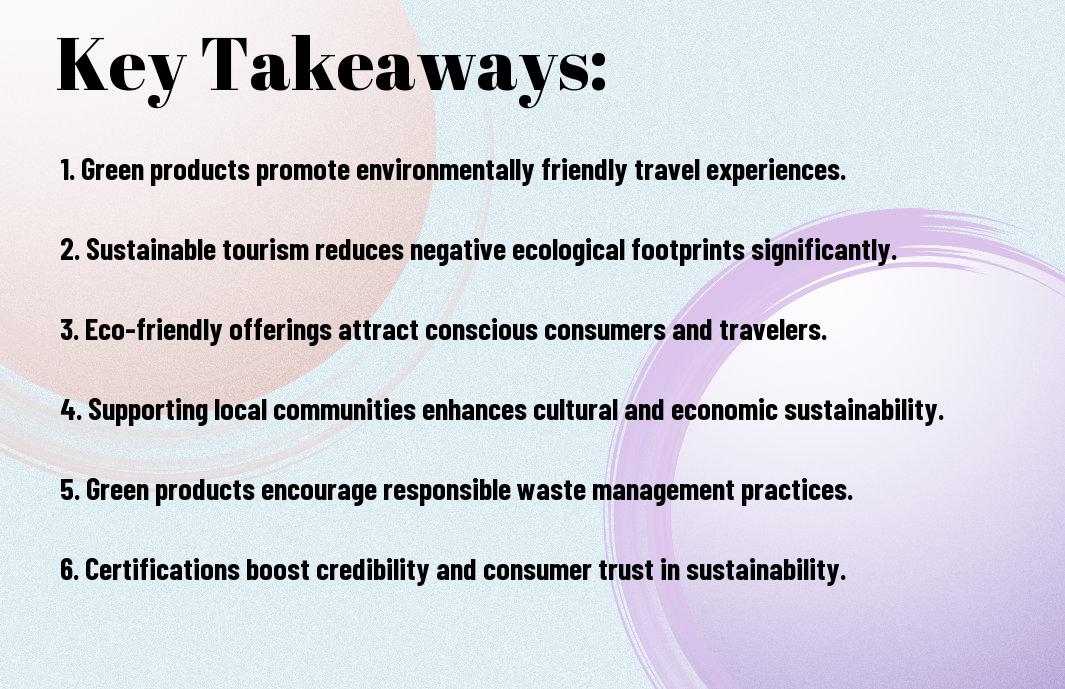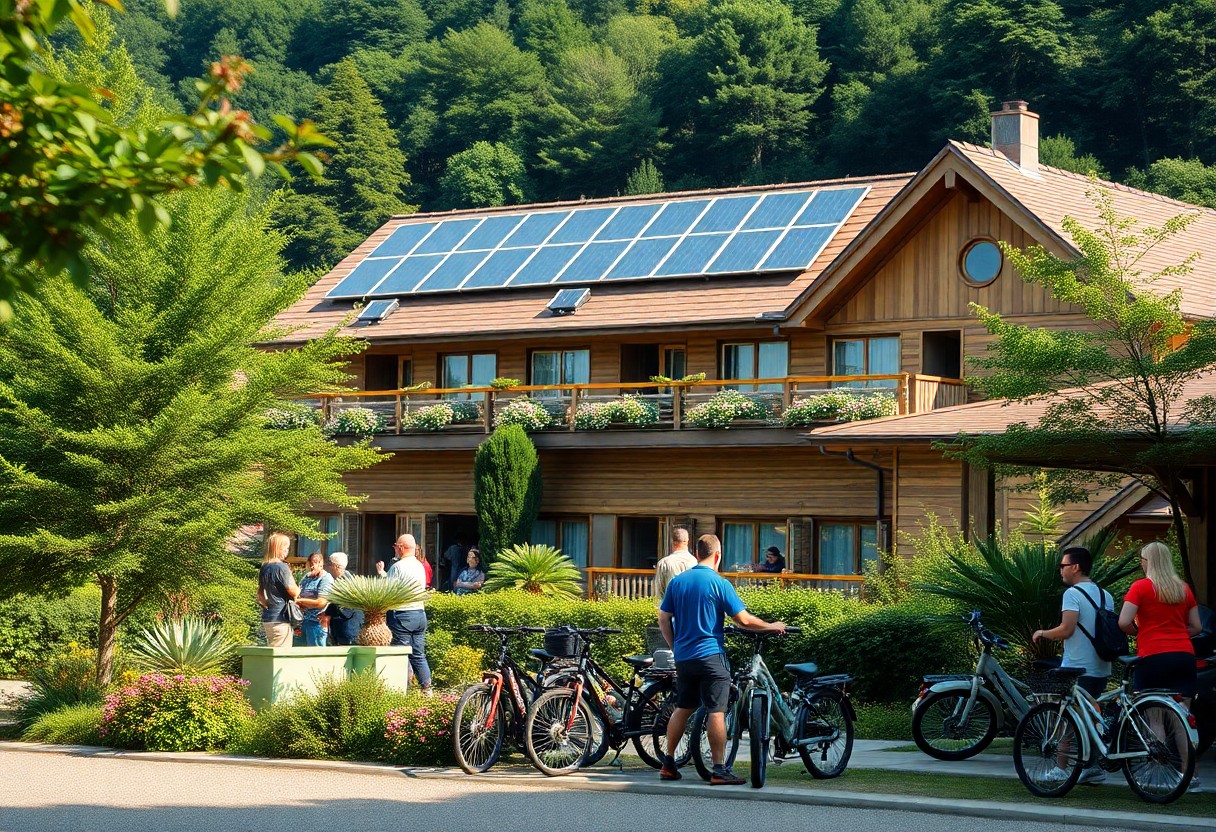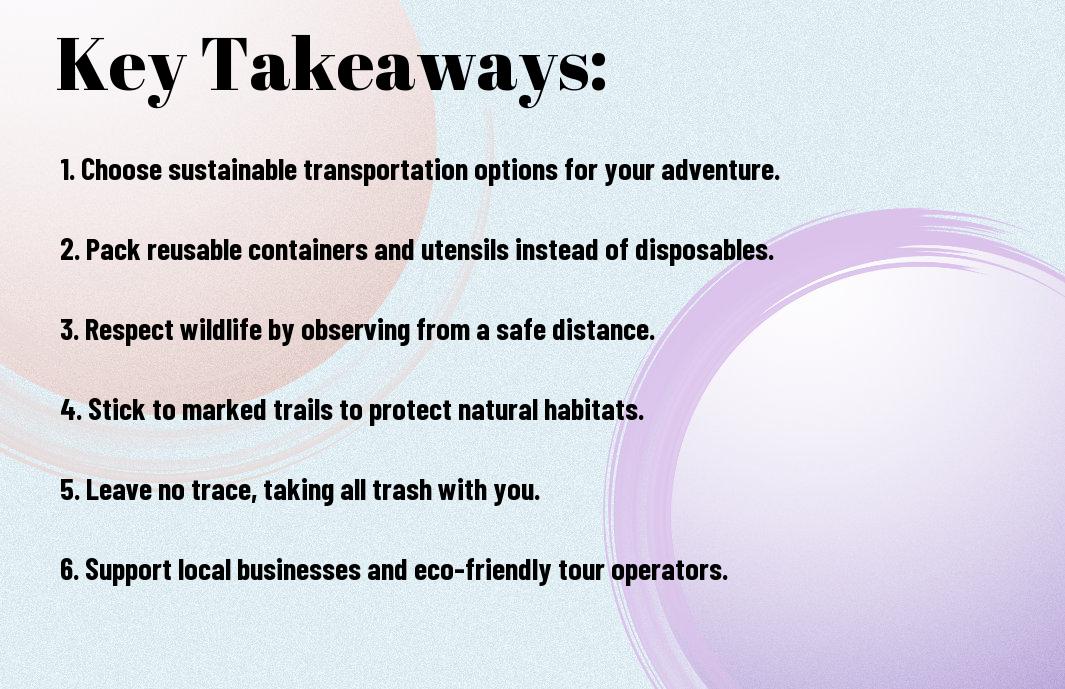As you set off on your next adventure, you’re likely thinking about the amazing experiences that await you, but have you considered your impact on the places you visit? You have the power to make a positive difference, and with a few simple tweaks to your travel habits, you can minimize your footprint and contribute to the preservation of our beautiful planet. Your travels can be a force for good, and this guide will show you how.
Key Takeaways:
To minimize your environmental footprint while traveling, consider the following points:
- Choose Eco-Friendly accommodations that use sustainable practices, such as Renewable Energy sources and Waste Reduction programs, to reduce your carbon footprint.
- Plan your itinerary to include Local Transportation methods, such as walking or biking, and opt for Sustainable Tour operators that support Environmental Conservation efforts.
- Pack Light and avoid single-use Plastics by bringing your own Reusable water bottle, bag, and other vitals to reduce Waste and promote Sustainable Travel practices.

Planning Ahead
For a stress-free and sustainable trip, it’s crucial to plan ahead, considering your impact on the environment and local communities from the outset. You’ll want to think about your destination, transportation, and accommodations, making informed choices that align with your values.
Researching Eco-Friendly Destinations
Destinations that prioritize sustainability are becoming increasingly popular, and you can find plenty of options that cater to eco-conscious travelers like yourself. You’ll discover places that boast environmentally-friendly practices, from renewable energy to waste reduction, allowing you to make a positive impact on the local environment.
Choosing Sustainable Transportation
On the move, you have the power to choose transportation methods that minimize your carbon footprint. You can opt for trains, buses, or even biking, which not only help the planet but also offer a more immersive experience, allowing you to connect with locals and take in the sights.
Further, when choosing sustainable transportation, you’ll find that it often leads to a more authentic and engaging travel experience. You might take a scenic train ride, walk through a new city, or bike along a coastal path, all while doing your part for the environment and enjoying the journey, rather than just focusing on the destination, which is a big part of the fun of traveling, after all, getting to your destination with a clear conscience.
Reducing Waste
If you want to make a positive impact on the environment while traveling, check out How to travel better: a beginner’s guide to sustainable travel in 2023 and beyond for tips. You’ll learn how to minimize your footprint and contribute to a more sustainable future.
Avoiding Single-Use Plastics
To minimize waste, opt for refillable water bottles and coffee containers. You’ll not only reduce plastic waste but also save money in the long run.
Using Reusable Bags and Containers
Before you head out, pack reusable bags and containers to avoid using disposable ones. You’ll be surprised at how much of a difference this simple step can make.
Even with reusable bags and containers, you can take your sustainability efforts to the next level by choosing products made from eco-friendly materials. You can explore local markets for unique, handmade options that will also support the local community, making your travel experience even more authentic and rewarding.
Conserving Resources
Your travels can have a significant impact on the environment, and conserving resources is a key part of sustainable travel. By making a few simple changes, you can reduce your footprint and help preserve the beauty of the places you visit.
Minimizing Water Usage
Beneath the surface of your daily habits, there are many ways to save water while traveling. You can take shorter showers, turn off the tap while brushing your teeth, and avoid wasting water in your hotel room.
Reducing Energy Consumption
With a little awareness, you can significantly reduce your energy consumption on the road. You can turn off lights and air conditioning in your hotel room, use public transport, and choose eco-friendly tour operators.
The details of reducing energy consumption while traveling are worth exploring further. You’ll find that many hotels and tour operators now offer eco-friendly options, such as energy-efficient lighting and sustainable transportation. By choosing these options, you can lower your carbon footprint and contribute to a more sustainable travel industry.

Supporting Local Communities
Keep in mind that your travels can have a significant impact on the local economy and environment. By supporting local communities, you can help preserve their unique culture and way of life.
Eating at Local Restaurants
Akin to authenticity, opting for local eateries allows you to experience the true flavors of the region, while also putting your money directly into the local economy, benefiting your hosts and enhancing your travel experience.
Shopping at Local Markets
Above all, browsing local markets gives you the opportunity to discover unique, handmade products and interact with the people who created them, allowing you to take a piece of the community back home with you.
This experience not only supports the local artisans but also provides you with a chance to learn about their craft and the story behind each item, making your purchases even more meaningful and allowing you to share your newfound knowledge with others, fostering a deeper appreciation for the local culture.
Respecting the Environment
To minimize your impact on the environment, you’ll want to adopt some simple yet effective habits while traveling. This includes being mindful of your actions and their consequences on the places you visit.
Protecting Wildlife and Habitats
By taking a thoughtful approach to your travels, you can help preserve the natural beauty of your destinations. You’ll avoid disturbing or disrupting the local wildlife and their habitats, ensuring that they thrive for years to come.
Reducing Carbon Footprint
To reduce your carbon footprint, you’ll want to make conscious choices about your transportation and activities. You can opt for eco-friendly options, such as walking or cycling, and choose tour operators that adhere to sustainable practices.
Carbon emissions are a significant concern for travelers, and you can take steps to mitigate your impact. As you explore your destinations, consider offsetting your flights, using public transport, or carpooling to minimize your carbon footprint, and you’ll be contributing to a more sustainable future for the places you love to visit.
Staying Mindful
Despite the excitement of exploring new destinations, it’s easy to get caught up in the moment and forget about your impact on the environment and local communities. As you travel, you’ll encounter various cultural norms and practices that may be unfamiliar to you, and it’s vital to be thoughtful and considerate in your interactions.
Being Aware of Cultural Differences
One of the most significant aspects of mindful travel is being aware of the cultural differences that exist between your home country and your destination. You’ll need to adapt to new customs, traditions, and ways of life, and being open-minded and flexible will help you navigate these differences with ease.
Respectful Tourism Practices
Among the many ways you can practice mindful travel, adopting respectful tourism practices is key. You’ll want to be thoughtful about your actions and how they may impact the local environment and community, whether it’s reducing your use of single-use plastics or supporting local businesses.
Mindful of your surroundings, you’ll start to notice the small changes you can make to reduce your footprint, such as choosing eco-friendly accommodations, using public transport, or avoiding activities that may harm the local wildlife. As you become more aware of your impact, you’ll find that making sustainable choices becomes second nature, and you’ll be able to enjoy your travels with a clear conscience, knowing that you’re contributing to the preservation of the places you visit.
Final Words
Taking this into account, you’ll find that staying sustainable while traveling becomes second nature. As you wander through foreign lands, your footprint will be lighter, and your impact more positive. You’ll savor local flavors, support eco-friendly establishments, and preserve the beauty of your destinations for future generations to enjoy. By making a few simple changes to your travel habits, you’ll not only help the planet, but also enrich your own travel experiences. Your journeys will be more authentic, and your memories more meaningful.
FAQ
Q: What are some simple ways to reduce my environmental impact while traveling?
A: To reduce your environmental impact while traveling, start by choosing eco-friendly accommodations, such as hotels or lodges that have implemented sustainable practices like solar power, recycling, and reducing water waste. Additionally, opt for public transportation, walk, or bike whenever possible, and avoid single-use plastics by carrying a refillable water bottle and shopping bag. You can also reduce your carbon footprint by offsetting your flights and choosing tour operators that follow sustainable tourism practices.
Q: How can I minimize my waste while traveling, especially in countries with limited recycling facilities?
A: Minimizing waste while traveling requires careful planning and attention to detail. Start by packing lightly and avoiding single-use plastics, such as straws, bags, and water bottles. Choose products with minimal packaging, buy in bulk, and avoid products with excess packaging. When shopping, opt for local and seasonal products, and avoid buying items that are packaged in plastic. You can also bring a portable water filter or purification tablets to reduce your reliance on bottled water. Finally, dispose of your waste properly, and participate in local clean-up initiatives or beach cleanups to give back to the community.
Q: What are some sustainable transportation options I can use while traveling?
A: There are several sustainable transportation options you can use while traveling, depending on your destination and budget. Consider using public transportation, such as buses, trains, or subways, which are often affordable and environmentally friendly. You can also walk or bike, which are great ways to explore local areas and get some exercise. If you need to take a taxi or ride-hailing service, consider choosing an eco-friendly option, such as an electric or hybrid vehicle. Additionally, consider offsetting your flights by investing in carbon offset projects, such as reforestation or renewable energy initiatives.
Q: How can I respect local cultures and environments while traveling, and avoid contributing to overtourism?
A: Respecting local cultures and environments while traveling requires sensitivity, awareness, and planning. Start by researching your destination and understanding local customs, traditions, and environmental concerns. Be respectful of local communities, and avoid behaviors that could be perceived as disruptive or disrespectful, such as taking photos of people without permission or littering. Choose tour operators that follow sustainable tourism practices and support local economies. Additionally, consider visiting during the off-season or traveling to lesser-known destinations to avoid contributing to overtourism. Finally, support local conservation efforts, and participate in community-based tourism initiatives that promote cultural exchange and environmental stewardship.
Q: What are some eco-friendly products I can pack to reduce my environmental impact while traveling?
A: There are several eco-friendly products you can pack to reduce your environmental impact while traveling, including a refillable water bottle, a portable water filter or purification tablets, and a shopping bag or backpack made from sustainable materials. You can also pack a set of reusable bamboo utensils, a straw, and a container for take-out food. Additionally, consider packing eco-friendly toiletries, such as soap, shampoo, and toothpaste, that are free from harsh chemicals and come in biodegradable packaging. Finally, choose products that are designed for travel, such as a packing cube system or a travel-sized necessarys kit, to reduce waste and minimize your environmental footprint.



